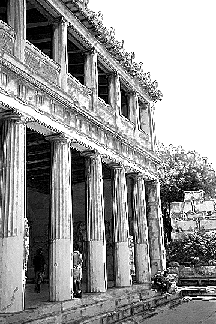 Fall 2000
Fall 2000
Course Description
This course has been selected to represent historical analysis in our core curriculum,
and thus will pay close attention to the workings of history. Traditionally Greek and Roman
history are broken down into four main periods:
the rather complicated early culture that we will inspect in Hesiod's poetry; the late period of the
Greek city-states (poleis) or the Classical Period within a hundred years of
consolidation by the Hellenistic warlords; the period of Roman ascendancy throughout
the world spanning from the mid-first century B.C. to the late first century A.D.; and
the late Roman (Christian) period from the third and fourth centuries A.D. We will work through
these four periods chronologicaly as we discuss a variety of ancient values
from the central issues surrounding war, rhetoric,
the gods, and law to mass culture, sexuality, and whatever else interests the class.
We will see some stunning changes throughout
our periods, as well as some unexpected continuity, probably with many of us
disagreeing with each other as we go. Such disagreement will lead to a more stimulating
experience of history, and perhaps to a more sensitive understanding of our own values.
1) evidence of serious thought on their chosen argument/problem
Course Requirements
Grading
Texts
Policies
Course Description:
Most leading thinkers of the 20th century, and even
many popular intellectuals of the late 20th century (Derrida and Foucault to
name the two most influential), have agreed that the foundations of
many major facets of modern life were laid in ancient Greece and Rome. In the field of politics,
representational government originated in Greece and developed into republican
institutions in Rome. Intellectually the ancient mediterranean gave us almost
every field we recognize today from literature to philosophy, natural science
to communications. In Religion Greece left a rich tradition of pagan cults
(many enjoying a revival today), and the Roman world brought us the two most
influential religions of the modern world, Christianity and Islam. This course will
attempt to understand some of the complex forces that shaped ancient culture. But rather
than inspecting wars, political maneuvers, philosophical subtleties, literary artifice,
or artistic achievement, we will ponder the values of ancient Greeks and Romans, how
they were formed, and how in turn they helped form the many institutions still familiar
to us today.Course Requirements
This course is intended to stimulate thought, and thus the first and most difficult
requirement is to think.
This thinking will best be directed towards the readings so students will be
expected to read carefully all of the selections and be prepared to discuss
them in class. The discussion will be organized in the following way:
each student will present one of the readings by publishing an argument
on its significance to Greek and Roman values one class before we do the
reading; all students will also be expected to
both criticize and support the points of other speakers.
Each student will edit her argument taking into account the class discussion,
and turn this in as her paper (10 pages, double-spaced, 12 point font, 1 inch margins)
for the course. There will also be two tests given
in order to help inspire more careful and punctual reading, as well as in order to
synthesize the material of the course.Grading
2) clarity of proposed argument/analysis/system
2) command of the appropriate reading (or whatever evidence is applied)
3) ability to draw in other sources to the discussion
4) command of general history surrounding the specific problem
5) familiarity with the class discussion
6) persuasiveness of argument
7) synthesis of specific problem into the broader issues of Greek and Roman values
8) originality or at least attempted originalityAssignments (some of these links can only be accessed on campus):
back to beginning
Texts
back to beginning